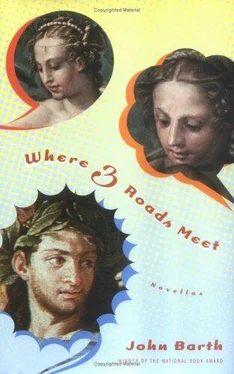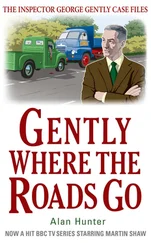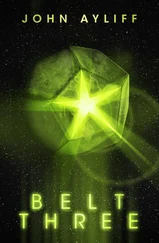"From all of which one infers," inferred Sir Self-Appointed, "that there's been some Narrative Movement, shall we say? You're farther down the capital-R Road than you were before I drove up, and methinks that's because I drove up, in yonder bucket-o'-bolts Dramatic Vehicle."
"Do tell."
With conspiratorial elbow-nudge, "My job description, right? Who not only, in driving up, assumed ipso facto the role of Sidekick Helper, but in due discharge of that classic role supplied nonplused Hero with better-than-nothing Magic Potion plus handy-dandy Tool/Weapon/Whatever" — indicating in turn the now-empty brew bottles and the now-pocketed Swiss Army gizmo wherewith he'd earlier flipped their lids—"and ready-for-action tricyclical DeeVee. In return for which, thankee, you've got me Telling now a mile a minute, who just a few pages back was wondering whether I had anything left to tell!"
"And not only telling," I started to say, "but—"
"Taking words out of your mouth instead of putting 'em in? I know, I know: Forgive me that, man" — smacks me upside the near shoulder—"it just feels so damn right to be back in action again, you know?"
So I'm told, said I, unless he said it for me: Putting pedal to the metal on one of those DV contraptions can do that to a fellow. Been there myself.
"And time to go again!" cries he— exclaims, exuberates, whatever, up off our bench and on his feet. "Before old Lizzie runs dry."
Like us?
"Speak for yourself, friend — so to speak? And never mind job descriptions from here on out: We're in this together."
Mm-hm. In what, exactly?
Tugs my coatsleeve. " In medias res, man, soon's we climb aboard. You drive the Herocycle; I'll narrate the blow-by-blow."
Um…?
"Okay, okay: You drive; I'll narrate and navigate as needed. Nudge things along. Sidekick 'em, let's say."
Like for instance (we're in his not-all-that-Dramatic Vehicle now, his quote Herocycle, and I tell you this in parentheses because my dialogue quotes seem to've gotten left back on that rock-bench with our empties), which way do we go, S.K.? Can't flip a coin, unless you happen to have a three-sided nickel in there with your Handy-Dandy.
He cranes his stringy neck to consider, or at least to seem as if considering, our options in turn. Adjusts his specs. Then says, "Well, now: Seeing's how you came here from Back There," indicating the road that once upon a time led from my City, a bit east of north from our conjunction, "and I came out of Left Field yonder" — left from that city's point of view, and a bit east of south from said conjunction—"I reckon we should head out yonder on The Road Not Taken — at least not by us, at least not this time out. Off we go?"
My turn then to consider, as H.C. Lizzie idled erratically and I checked out her four-on-the-floor transmission, her mostly nonfunctioning dials and gauges, stiff steering, too-soft brakes, and what-all. Back There was everyone I'd ever been, for better or worse: not Oedipus/Odysseus/Perseus/ Aeneas & Co., but their stories (including old Don Quixote's, whose nag Rocinante was the four-legged equivalent of our sputtering, spavined three-wheeled Liz). Off yonder where she and her geriatric driver had rattled in from, if we take him at his word (and what else is he, Mr. S.K. Izzy, if not his words?), was every tale he'd told to date — no doubt including a few variations of Yours Truly in one getup or another, if he was like most of his ilk. Why rerun old footage from any of those once-upon times? What's more (you can do this on your watch dial, Reader, if you don't happen to have a compass on your Swiss Army knife), inasmuch as Where I'm Coming From lay more or less north-northeastward — five minutes past the hour, say, at the 1 on your analogue watch? — and where he came from lay south-southeastward at the 5 (or twenty-five past), Road #3 stretched out due west, straight into the sun just now approaching set at a quarter till: fit hour for our game's last quarter, and mine. No capital-H Hilltop in sight over there beyond the 9 on your watch dial, but "Maybe that's what makes the thing Mysterious," offered we-know-who: "Shall we go have a look?"
By way of reply I shifted Liz into first, eased out her cranky clutch, stick-shifted into second, and — so I'm being told! —floored that mother.
2
How come this part's labeled "2," some sharp-eyed nit-picker's bound to ask, when what went before it wasn't labeled "1"?
Time was, I could answer back, when "Fred" and I minded such p's and q's, but we're past that nowadays. Fact is, however (I might point out in my capacity as the guy's faute de mieux Teller this time around), that inasmuch as he, for one, couldn't've known there'd be a Part Two till he hit Lizzie's pedal and landed us on this side of yonder space-break, he couldn't've bloody known that where we were before was Part One of anything, could he now, mate? So just maybe it's Symbolically Appropriate, as they say, for Part One to stand unlabeled as such; and just maybe some of us with a card or two still up-sleeve knew that all along.
Further questions?
Needn't've asked, I guess: There's always one eager beaver with hand in air. How's that? You're wondering why the "I" in "1" was Call-Me-Fred, the Old-Fart I've-Been-Told Story, but here in "2" it appears to be Call-Me-Izzy, the Sidekick Teller?
Well, since you've asked: You may recall F. and me a-hassling each other a bit about "job descriptions" back there in "1"? What the issue came down to was, does he do what I say, or do I merely say what he does? 'Twas a tricky enough matter back when "he" was Odysseus and "I" was one of Homer's bards: The sly guy finally gets home not because it occurred to me to make it happen, but because (as the whole house knew) that's how his story'd always gone, which "Homer" most memorably arranged so that hacks like "me" could invoke Ms. Muse to sing you the news (through us) with whatever riffs and flourishes we saw fit. Got that? Later on, when "he" becomes Aeneas, say, and "I" become Virgil, the game changes: Within the stretchable bounds of Roman folk tradition, A. does what he does because V. was inspired not only to dream up his doing it, but to write those imaginings down for all time in good Latin hexameters that are in large measure A.'s marching orders as well as V.'s artful report thereof: "I sing of arms and the man," goes Maestro Virgil's written score, not "Sing, O Muse," et cet. Come then to a "he" who's e.g. Don Quixote and an "I" who's Don Miguel de Cervantes Saavedra, everything "he" does he does because "I" say so: Although I pretend I'm just reporting the news from La Mancha, D.Q. shoots exactly the shots I call, exactly as I've seen fit to invent those shots and call 'em. Things don't get truly dizzy-making again until you get an "I" who's Mr. Mark Twain, say, and a "he" who's young Huck Finn telling his own story first-person— i.e., as an I! "You don't know about me without you have read a book by the name of The Adventures of Tom Sawyer, " etc. Yet even that comes down to a fairly simple division of labor, finally, between Author/Teller and Narrator, doth it not? Twain "records" Huck's report of what-Huck-did-because-Twain-imagined-and-put-into Huck's-words-Huck's-doing-so, right? Or, to put it another way, Author tells Reader Narrator's telling-to-Reader of Tale-made-up-by-Author.
A tad vertiginous, sure, but no problem! Nor any question who's finally in charge. But now — fasten seat belts, folks — suppose First-Person Narrator of story to be not only its principal character, but It: the Story itself, telling us itself itself! Who's in the driver's seat now, I ask you, leapfrogging space-breaks and barreling us westward lickety-split through a landscape thus far featureless perhaps for want of Narrator's supplying us with its features? Moreover, since Setting is an ingredient of Story, as are accessory characters like Yours-Truly-as-Sidekick and Dramatic Vehicles like three-wheel Lizzie, how can "I"-the-Narrator of "Me"-the-Story differentiate himself from them/us in order to tell you us (except, I suppose, as "I" might tell of "my" toes and fingers, "my" hopes and fears, "my" self…)?
Читать дальше












